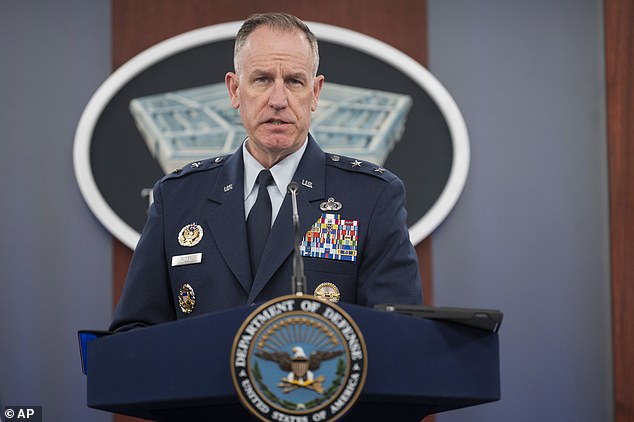The United States made multiple claims this week that Russia had launched what could be an anti-space weapon into the same orbit as a US satellite.
Maj. Gen. Pat Ryder confirmed the news at a news conference on Tuesday, after US Ambassador Robert Wood made the initial allegation to the UN on Monday.
“What I’m following here is that on May 16, as you highlighted, Russia launched a satellite into low Earth orbit that we believe is likely to be an anti-space weapon, presumably capable of attacking other satellites in low Earth orbit.” Ryder said. ABC News.
“Russia deployed this new anti-space weapon in the same orbit as a US government satellite,” he added. “And so, the assessments further indicate features that resemble counterspace payloads previously deployed in 2019 and 2022.”
It came after Wood made the statement to the UN on Monday, as the United States and Russia drafted rival resolutions in an attempt to ban weapons in space.
The United States made multiple claims this week that Russia had launched what could be an anti-space weapon into the same orbit as a US satellite. Maj. Gen. Pat Ryder confirmed the news at a news conference Tuesday.
The drafts focused on different types of weapons, with the United States and Japan specifying weapons of mass destruction. The Russian draft discussed all types of weapons.
Members of the United Nations Security Council condemned the actions even as they failed to pass a measure against them.
“The culmination of Russia’s campaign of diplomatic deceit and deception is the text before us today,” Deputy US Ambassador Robert Wood told the council.
Russia’s ambassador to the UN, Vassily Nebenzia, denied that his nation was trying to deceive the world. Backed by China and others, he called the vote “a unique moment of truth for our Western colleagues.”
“If they do not support this, then they will clearly demonstrate that their top priority remains maintaining freedom to accelerate the militarization of outer space,” Nebenzia said.
Every nation says it wants weapons banned from space, and council members repeated that on Monday.
But when it came time to vote, the council was evenly divided 7-7 between supporters of the United States and Russia, with Switzerland abstaining. The measure failed under UN rules because it did not receive nine votes.
Ryder said the United States remains vigilant about what appears to be Russia’s attempt to weaponize space.
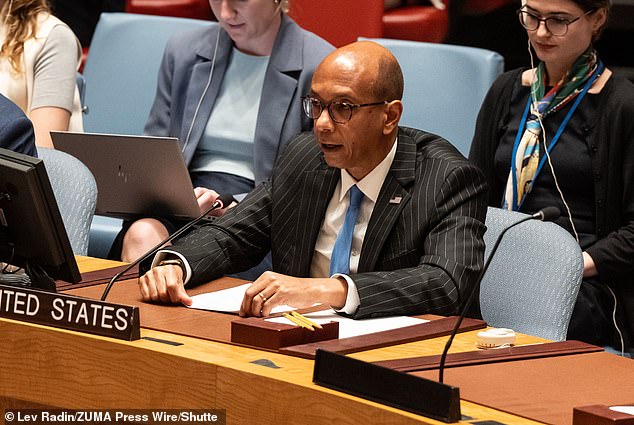
US Ambassador Robert Wood made the initial allegation to the UN on Monday.
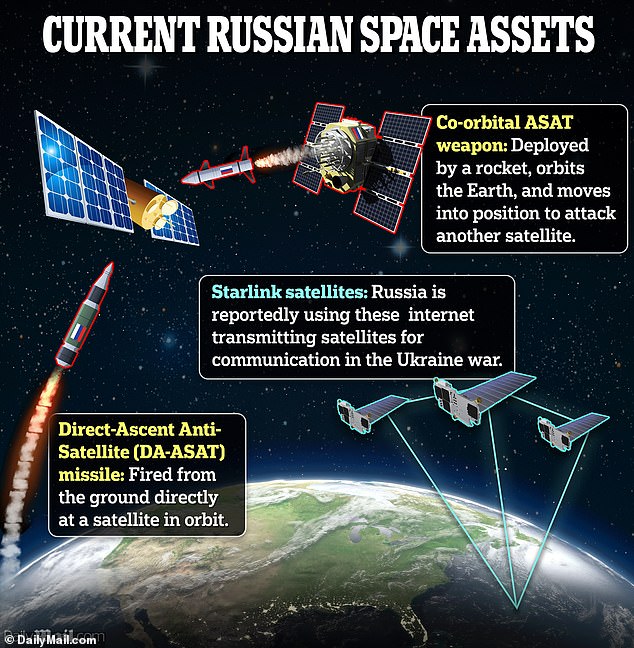
Russia already has several space-based military assets. These include co-orbital anti-satellite (ASAT) weapons, ASAT direct ascent missiles and Starlink communication satellites that it is contracting for its war against Ukraine.
“Obviously, that’s something we’ll continue to monitor,” he said. “Certainly, we would say we have a responsibility to be prepared to protect and defend the space domain and ensure continued, uninterrupted support to the joint and combined force.”
“And we will continue to balance the need to protect our interests in space with our desire to preserve a stable and sustainable space environment.”
Ryder did not say whether the United States knew in advance that Russia was going to carry out the launch.
In early May, a Pentagon official warned lawmakers that Russia’s development of a nuclear space satellite could disable all other global satellites for up to a year.
Satellites are not built to withstand radiation from a nuclear explosion and some could be destroyed by the explosion and have “devastating” consequences for the capabilities of the United States and other countries in space.
This is the first time the Biden administration has openly discussed “indiscriminate weaponry” in an open congressional hearing, following an explosive revelation by lawmakers in February.
Meanwhile, China launched the first mission to collect samples from the dark side of the Moon, even as the US government warned that China could claim ownership of the Moon if it reaches the lunar surface first.
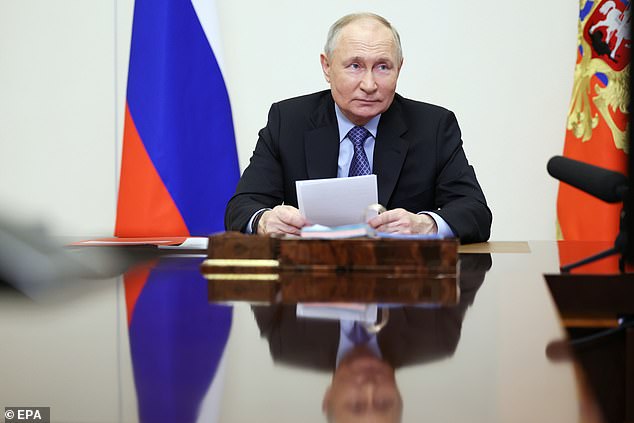
Russian President Vladimir Putin (pictured) has denied claims that the country is building a nuclear anti-satellite that could destroy all other satellites in space for up to a year.
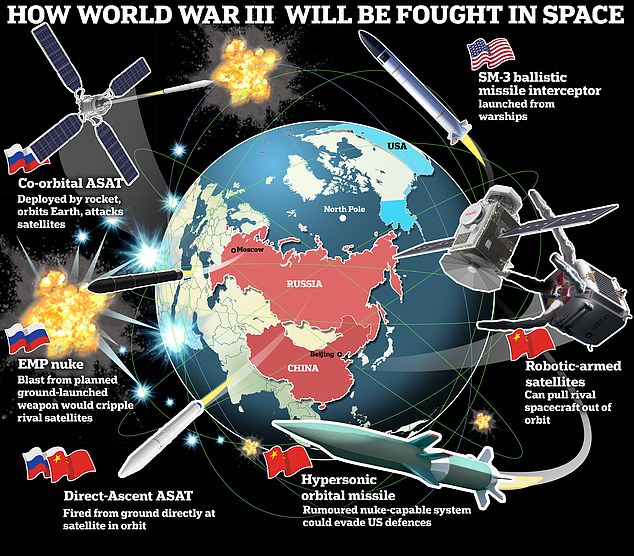
“The idea that worries us is that Russia will develop and, if we are not able to convince them otherwise, eventually launch a nuclear weapon into space that will be an indiscriminate weapon,” said John Plumb, assistant secretary of Defense for Space Policy. . he said at a House Armed Services subcommittee hearing.
He added that the weapon would not distinguish between civilian, commercial or military satellites that provide cell phone reception, Internet access and data on foreign threats.
SpaceX’s Starlink has 5,400 satellites in orbit that have been vital for Ukraine to stay online and have communication capabilities during the current Russian invasion.
In February, lawmakers warned for the first time that Russia was developing a nuclear anti-satellite, also called a nuclear EMP, that posed a “serious national security threat” to the United States.
“Our general knowledge of the Russian pursuit of this type of capability goes back many, many months, if not a few years,” said National Security Council spokesman John Kirby. cnn At the time.
“But only in recent weeks has the intelligence community been able to assess with greater confidence exactly how Russia continues to pursue him.”
The weapon has not yet been placed in space and Plumb said there is no “imminent” threat to public safety and that the anti-satellite could not attack humans or cause physical destruction on Earth.
However, if the nuclear EMP is implemented, it “could pose a threat to all satellites operated by countries and companies around the world, as well as vital communications, scientific, meteorological, agricultural, commercial and national security services of those we all depend on.” said Plumb.
Shortly after lawmakers said Russia was building the anti-satellite nuclear weapon, Russian President Vladimir Putin vehemently denied the reports during a meeting with his Defense Minister in Moscow and stated that he was against the deployment of nuclear weapons in space.
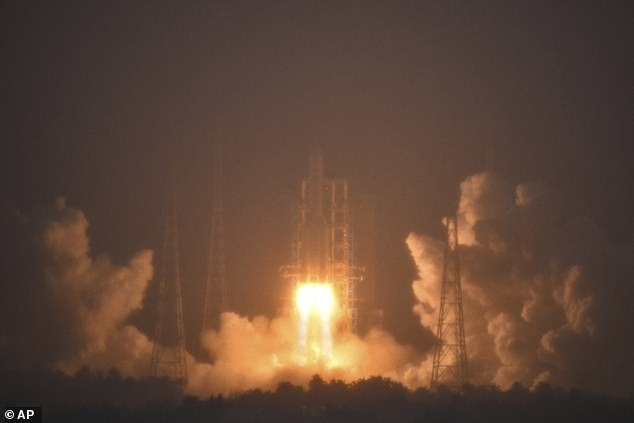
China on Friday launched its Chang’e 6 rocket (pictured) that will travel to the dark side of the moon to collect rock samples from the lunar surface.
Concerns about Russia’s potential impact on space satellites come as China launched the Chang E’ 6 mission to the far side of the Moon on Friday, becoming the first country to deploy a mission to the region.
Last month, NASA warned that China could be using its civilian space program as cover for military operations and that its plans to create a landing base on the lunar surface could pose a threat to national security.
He noted that much of his concern comes from the Chinese space programs’ close ties to the People’s Liberation Army, a military branch of the Communist Party.
“My concern would be if China got there first and suddenly said, ‘Okay, this is our territory, stay out,'” Nelson said.
He said his concern stems from Chinese space programs’ close ties to the People’s Liberation Army, a military branch of the Communist Party.
“My concern would be if China got there first and suddenly said, ‘Okay, this is our territory, stay out,'” Nelson said.
He argued that if anyone doubts his warning, they should look at Beijing’s claims that it owns most of the territory in the Spratly Islands in the South China Sea, which China, Taiwan, Vietnam, Malaysia and the Philippines jointly own.
“China has made extraordinary progress, especially in the last 10 years, but they are very, very secretive,” Nelson said at the hearing.
“We believe that many of your so-called civilian space programs are military programs,” he continued. “And I think we are indeed in a race.”

